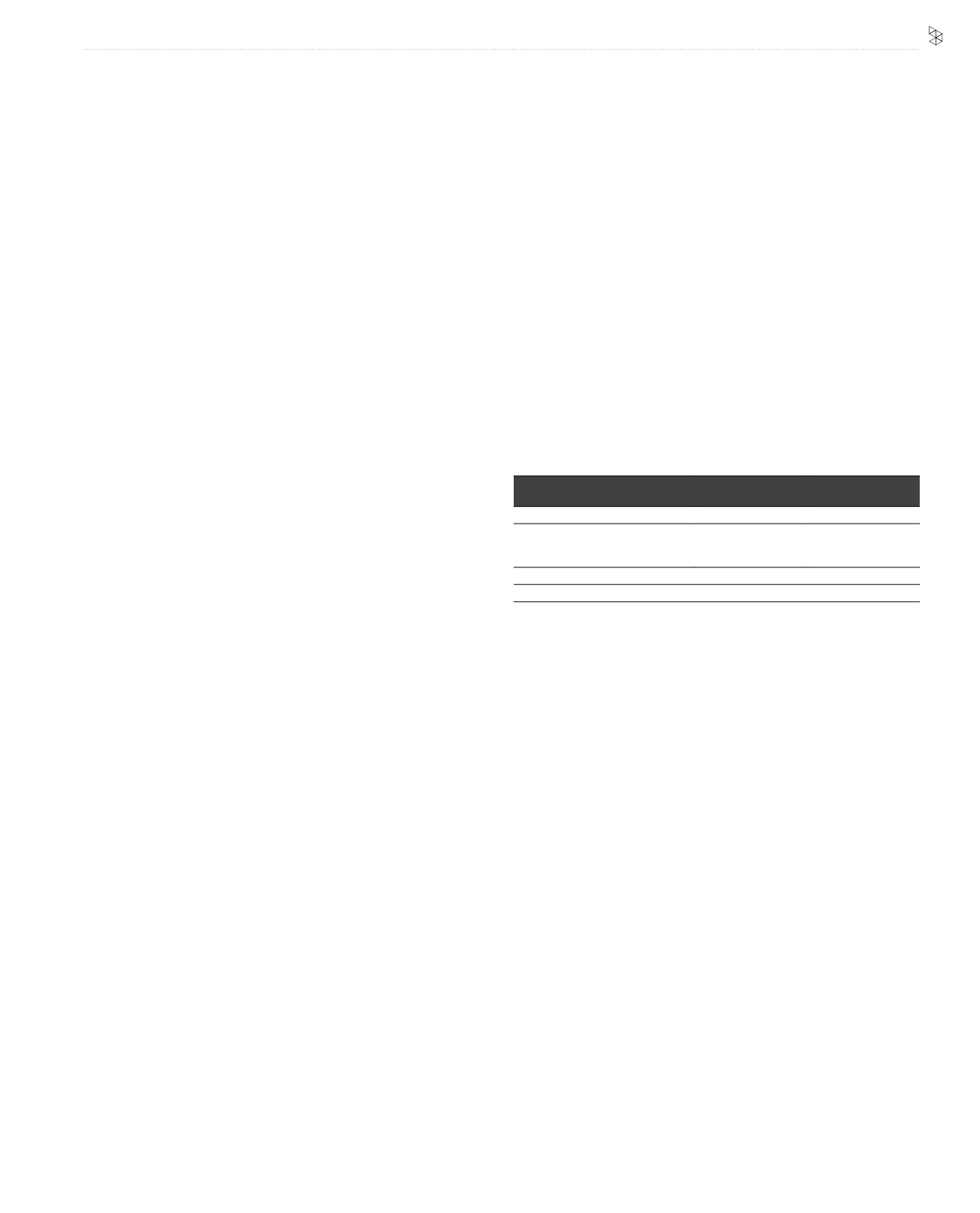

GOVERNANCE
Axiata Group Berhad | Annual Report 2016
091
While members of the media are not invited into the AGM meeting hall,
a media conference is usually held immediately after the AGM where the
Chairman, President & GCEO and GCFO update media representatives on
the resolutions passed and answer questions on matters related to the
Group. This approach provides the Company with a more efficient way to
address both the shareholders and the media.
Dividend Policy
Axiata’s existing dividend policy provides that the Company intends to pay
dividends of at least 30% of its consolidated PATAMI and endeavours to
progressively increase the payout ratio over a period of time, subject to a
number of factors including business prospects, capital requirements and
surplus, growth/expansion strategy, considerations for non-recurring items
and other factors considered relevant by the Board.
As the Company is a holding company, its income and therefore its ability
to pay dividends, is dependent upon the dividends received from its
subsidiaries, which in turn would depend on the subsidiaries’ distributable
profits, operating results, financial condition, capital expenditure plans and
other factors that the respective subsidiary Board deems relevant.
Whilst the dividend policy reflects the Board’s current views on the Group’s
financial and cash flow position, the dividend policy will be reviewed from
time to time. It is the policy of the Board, in recommending dividends, to
allow shareholders to participate in the Company’s profits, as well as to
retain adequate reserves for future growth.
On 22 February 2017, the Board recommended a conservative Final
Dividend of 3 sen, implying a total dividend payout ratio of 50% (based
on FY16 normalised PATAMI of RM1,418.3 million (including the interim
dividend of 5 sen per Axiata Share paid last year on 7 November 2016). The
total dividend of 8 sen for the FY16 would tantamount to a total payout
of approximately RM715.5 million with a dividend yield of 1.7% (based on
a 3-month VWAP). The Final Dividend is subject to the approval of the
shareholders at this Annual General Meeting.
The Board’s decision on 50% dividend payout ratio was two-fold;
i)
Cautionary, prudent measure to ensure resilience against unpredictable
forex and market volatility, and
ii) Further spectrum costs in the next two years and investment for
strategic long term benefits:-
a) Increased capex investment where Axiata intends to be a clear
number one player in 4G and data leadership in selected areas in
all markets; and
b) Market consolidation and edotco expansion.
With the view to retain cash for future use, Axiata had in 2016 continued
with the implementation of Dividend Reinvestment Scheme in which
shareholders were given an option to elect to reinvest the whole or part of
the dividend declared by the Company for FY15 final dividends and FY16
interim dividends, with electable portion at 100%. 46.93% and 48.79% of
the final and interim dividend respectively were reinvested into shares.
FY15 Final Dividend
Total Cash Dividend Paid : RM562.0 million
Dividend Reinvested : RM497.0 million
Payment Date
: 8 July 2016
FY16 Interim Dividend
Total Cash Dividend Paid : RM228.0 million
Dividend Reinvested : RM218.0 million
Payment Date
: 7 November 2016
Key Performance Indicators
On 23 February 2017, the Company announced the Headline KPIs for FY17
as follows:-
Headline KPIs
Headline KPIs
@ Bloomberg Rate
Headline KPIs
@ constant currency
Revenue Growth (%)
9 - 11
8 - 10
Earnings before interest, Tax,
Depreciation and Amortisation
(EBITDA) Growth (%)
7 - 9
6 - 8
Return on Invested Capital (ROIC) (%)
4.5 - 5.0
4.5 - 5.0
Return on Capital Equity (ROCE) (%)
4.0 - 4.5
4.0 - 4.5
Note: Bloomberg rate assumes 1 USD = RM4.55, constant currency assumes 1 USD
= RM4.14. Assumed no material fluctuations of regional currencies against Ringgit
Malaysia
In establishing the FY17 Headline KPIs, the Management of Axiata has taken
into consideration; inter-alia, short term dilutive impact from the merger
with Robi, potential investment/losses at digital ventures and purchase price
allocation charges in relation to Ncell acquisition.
For 2017, heightened competition, tax and regulatory challenges remain
for the Group across most of OpCos particularly in Malaysia, Singapore and
India, with rising capex weighing in on overall performance and profitability.
The Group hope to see currency volatility and global macroeconomic
factors to stabilise in 2017.
With major business and organisational changes made recently, the
Group expects to see better performance especially at Celcom and XL.
Barring regulatory changes, Axiata expect that the OpCos in South Asia
will continue its momentum of excellent performance; particularly at Robi
post-merger and Ncell. The Group is working towards group-wide cost
management to improve Group profitability; RM800 million Opex and
Capex savings are built in Axiata’s 2017 plan, as well as aiming for RM1.5
billion additional savings in 2018 and 2019.









